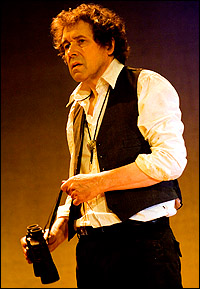
*
Stephen Rea had put in years of yeoman work on the stages of Dublin and London before his big international starburst of 1992, when he arrived full-blown in two mediums at once. That year he garnered Golden Globe and Oscar nominations for the quirky thriller "The Crying Game" and began his Tony-nominated run in Someone Who'll Watch Over Me.
He won work rather than awards. "Up until the year I came to Broadway, I had done mostly theatre with occasional films," he observed transatlantically the other day. "Now I do mostly films with occasional theatre. I didn't plan it that way, because I enjoyed nothing more than acting in New York. . . . I'm so looking forward to be back at work there."
The vehicle that is bringing Rea back for the first time in 16 years is a dead horse he found in his own backyard of Dublin. "Fiach Mac Conghail, the artistic director of the Abbey [Theatre], wanted to put on all the plays of Sam Shepard and even suggested that he write a new one. They talked a bit about that, and then Sam said, 'Why don't I write a play for Stephen?'" The result, which debuted at the Abbey and plays The Public Theater here June 25–Aug. 10, is Kicking a Dead Horse, which Rea does repeatedly during this hour that constitutes Shepard's first play in four years.
 |
||
| Stephen Rea in Kicking a Dead Horse. |
||
| photo by Ros Kavanagh |
Rea of Belfast and Shepard of Fort Sheridan, IL, crossed paths in London when the latter directed Rea in his play Geography of a Horse Dreamer. Rea has performed other Shepards (Action, Buried Child, Killer's Head) there and directed one (Little Ocean).
Clearly, Shepard knew who he was getting when he took pen in hand for the first time since 2004. "When people write things for you, it's your character they care about. They care about the work you do, the delivery you might have. Also, Sam's strongly influenced by Sam Beckett, and I've worked with Beckett. Not much gets to Sam, but it gets to him that I actually worked with Beckett."
Early in his career, Rea did an Endgame under Beckett's direction. "He was not concerned about meaning but was concerned about rhythm and humor — imagery, really. It was much like being in the room with Sam Shepard. There's a kinship there. Of anybody writing today, I think the influence is most apparent in his work."










